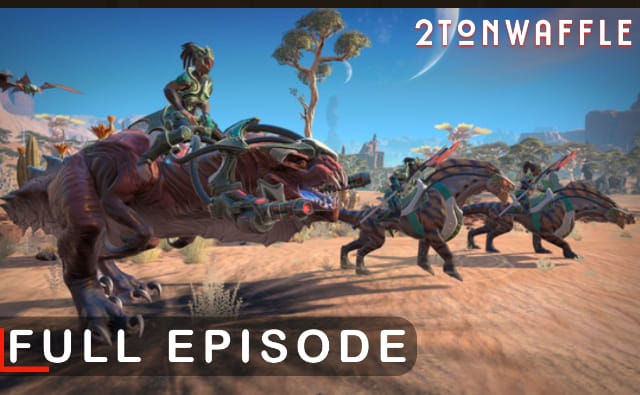Age of Wonders: Planetfall - A Deep Dive Into Turn-Based Sci-Fi Strategy
Age of Wonders: Planetfall nails turn-based sci-fi strategy with accessible complexity. Excellent tutorial, tactical combat, and streamlined management make this backlog gem an instant classic. Multiple factions ensure replayability. 4/5 stars.

TL;DR
Another backlog warrior falls to the "First Two Hours" treatment
Well folks, here we are again with another edition of what I like to call "Josh vs. His Steam Backlog" – and this time, the victim is Age of Wonders: Planetfall. You know how it goes: you pick up a game in some Humble Bundle years ago, it sits there staring at you accusingly from your library, and eventually you either play it or pretend it doesn't exist. Today, we're doing the former.
Before I even got into the actual game, I had to deal with the modern gaming experience of needing a Paradox account just to breathe near their software. Look, I get it – online features, telemetry, all that jazz – but sometimes you just want to click "play game" and actually play the game. After wrestling with password resets and spam folders (seriously, who falls for those "compensation for funds" emails anymore?), we finally got rolling.

First Impressions: Not Your Grandfather's Age of Wonders
For those unfamiliar with the Age of Wonders franchise, Planetfall is the sci-fi entry in what's traditionally been a fantasy strategy series. Think of it as what happens when you take the empire-building DNA of Civilization, inject it with the tactical combat of XCOM, and wrap it all up in a post-apocalyptic space opera aesthetic.
The game opens with that classic sci-fi setup: you're a commander whose ship has just emerged from some kind of void space incident, investigating a distress call on a planet near a mysterious anomaly. It's not going to win awards for originality, but it gets the job done and sets up the tutorial nicely.
Speaking of the tutorial – and this is important – it's actually good. Like, really good. Too many strategy games either skip the tutorial entirely or give you some bare-bones "click here, build this" nonsense. Planetfall takes over an hour to walk you through its systems, and I never felt bored or overwhelmed. That's saying something, considering I spent 90 minutes just on the tutorial portion.
Graphics and Presentation: Pretty Enough for Government Work
The graphics aren't going to make your RTX 4090 weep tears of joy, but they absolutely don't need to. This isn't about photorealistic explosions – it's about clear, readable information and distinctive faction designs. The hexagonal grid system gives everything that classic board game feel that I'm a sucker for (yes, I turned on the hex grid overlay immediately, fight me).
Character models are solid, especially when you consider the scope of what they're trying to present. Each faction feels visually distinct – the Vanguard with their military aesthetic, the Assembly with their cyborg vibes, and the Amazons with their bio-engineering focus. The customization system is surprisingly deep too. I spent way too much time giving my Amazon commander a pink mohawk and cyberpunk glasses because, well, why wouldn't you?
Map design deserves special mention. These aren't just pretty backdrops – they're functional spaces that tell environmental stories. When that gravitronic wave hit during the tutorial and I watched the plant life change color across the entire map, that was a genuinely cool moment that sold the sci-fi atmosphere.
Gameplay: Where Complexity Meets Accessibility
Here's where Planetfall really shines: it manages to be deep without being overwhelming. Resource management exists but doesn't consume your life. You've got your basic resources – energy, food, production, research – but the game doesn't make you micromanage every single colonial output unless you want to.
The research system particularly impressed me. Two parallel tracks (military and society) that you can pursue simultaneously, with meaningful choices that affect your tactical options. Want to focus on laser weapons and hard-hitting tech? Go for it. Prefer bio-warfare and environmental manipulation? Also totally viable.
Combat is where the game really comes alive. You can auto-resolve battles if you're in a hurry, but the manual tactical mode is where the real meat is. It's turn-based, hex-based tactical combat that feels like a more streamlined version of what you'd find in games like Battletech or Phoenix Point. Cover matters, positioning matters, and there are enough tactical options to make each fight feel different.
The unit modding system is brilliant. Instead of just upgrading units linearly, you're fitting them with different equipment and modifications that change their battlefield role. Those nanite injectors that heal and boost damage resistance? Game-changer. Flechette ammunition that causes bleeding damage? Suddenly your basic troopers are terror weapons.
Sound Design: Hitting the Right Notes
Audio in strategy games often gets overlooked, but Planetfall nails it. The voice acting ranges from solid to genuinely entertaining – Captain Peter Visser's pirate accent alone is worth the price of admission ("The sea is a maiden of many moods. Most of them murderers.").
Background music strikes that perfect balance of being present without being intrusive. It builds tension during combat without drowning out the tactical decision-making process. Sound effects have weight – laser weapons sound appropriately devastating, explosions feel impactful, and the various faction-specific audio cues help sell the different technological aesthetics.
Strategic Depth: The Long Game
What really impressed me as I got deeper into the systems was how everything interconnects. Your faction choice doesn't just determine your starting units – it fundamentally changes how you approach problems. The Amazon bio-engineering tech tree opens up completely different strategic options compared to the Vanguard's military focus or the Assembly's cybernetic upgrades.
Diplomacy with NPC factions adds another layer. These aren't just obstacle generators – they're potential allies with their own agendas and questlines. The Growth faction's symbiotic relationship requests actually felt meaningful, not like generic fetch quests.
The empire management hits that sweet spot between simple and engaging. You're not drowning in micromanagement, but there are enough meaningful decisions to keep you invested. When do you expand? How do you balance military research with economic development? Which sectors do you annex versus which ones get forward bases?
Technical Performance: Smooth Sailing
Running everything on ultra settings, I encountered zero performance issues. Load times are reasonable, the UI is responsive, and I didn't hit any game-breaking bugs during my session. For a strategy game with this many moving parts, that's actually impressive.
The interface deserves particular praise. Information is clearly presented, important options are easily accessible, and the various overview screens give you the data you need without overwhelming you. The unit template system is especially clever – instead of having to manually mod every single unit individually, you can create templates and apply them to entire armies.
The Verdict: A Worthy Addition to Any Strategy Fan's Library
After spending a couple hours with Age of Wonders: Planetfall, I can confidently say this isn't going back into the backlog pile. This is the kind of game that'll have you looking at the clock and realizing the sun's come up because you just needed to finish "one more turn."
The tutorial alone convinced me that the developers understood their audience. They didn't dumb anything down, but they also didn't assume everyone was coming in as a franchise veteran. The complexity builds naturally, systems interconnect logically, and there's enough variety in faction gameplay to support multiple playthroughs.
My only real complaint is that the game does such a good job of teaching you its systems that you'll immediately want to restart with a different faction and approach. That's hardly a complaint, but it does mean your first campaign might end up being practice for your "real" playthrough once you understand all the mechanics.
Final Score: 4/5
Would I continue playing? Absolutely. Will this stay installed on my system? You bet. Age of Wonders: Planetfall successfully modernizes the classic 4X formula without losing what made the genre appealing in the first place. It's accessible enough for newcomers but deep enough to satisfy strategy veterans. For anyone who enjoys turn-based strategy games, this one's an easy recommendation.
Now if you'll excuse me, I need to go figure out how to optimize my Amazon bio-warrior build for the next session. Those gravitronic waves aren't going to survive themselves.
Next week's "First Two Hours" stream moves to 9 PM Eastern, because apparently I care about sleep schedules now. See you in the basement, folks.
FAQ
Q: How long is the tutorial and is it worth playing? A: The tutorial takes about 90 minutes and is absolutely essential. It's one of the best strategy game tutorials I've experienced, teaching complex systems gradually without boring you to death.
Q: Can you play this without knowledge of previous Age of Wonders games? A: Absolutely. Planetfall is sci-fi focused while previous entries were fantasy, and the game assumes no prior franchise knowledge. Perfect entry point for newcomers.
Q: How does combat work and can you skip it if you want? A: Combat is turn-based tactical battles on hex grids. You can auto-resolve for speed or manually control everything for maximum strategy. Both options work great depending on your mood.
Q: Is the micromanagement overwhelming like other 4X games? A: Not at all. Resource management is streamlined compared to games like Civilization. You can dive deep if you want, but the game doesn't force excessive micromanagement on you.
Q: How different are the various factions to play? A: Very different. Each faction has unique tech trees, units, and strategic approaches. Amazons focus on bio-engineering, Vanguard on military might, Assembly on cybernetics, etc.
Q: What are the system requirements and how does it perform? A: The game runs smoothly on ultra settings without performance issues. It's well-optimized and doesn't require cutting-edge hardware to look and play great.
Q: Is there multiplayer and how does it work? A: Yes, the game supports multiplayer with multiple players per world. The turn-based nature makes it perfect for playing with friends without time pressure.
Q: How does the unit customization system work? A: Units can be fitted with mods that change their battlefield roles. Think nanite injectors for healing, different ammunition types, or specialized equipment. Template system lets you save and apply configurations easily.
Q: Is the story/campaign worth playing or should I skip to sandbox? A: The campaign does a great job teaching mechanics while providing decent sci-fi storytelling. Even if you prefer sandbox play, the campaign serves as extended tutorial for advanced systems.
Q: How does this compare to other modern strategy games? A: It sits between Civilization's empire building and XCOM's tactical combat. Less overwhelming than Europa Universalis, more combat-focused than pure 4X games. Great middle ground for strategy fans.





